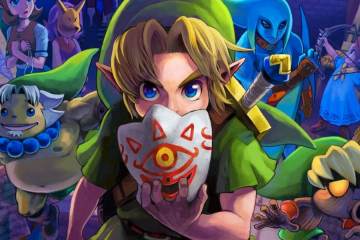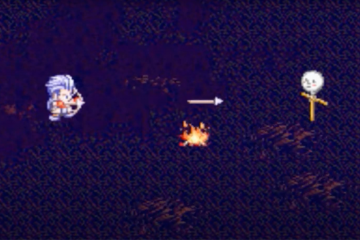With a Terrible Fate has been quieter than usual lately because, for the past few months, I have been working on a thesis to fulfill part of the requirements for my degree in philosophy. I am now pleased to say that this project is complete, and the result is a new theory of the ontology and metaphysics of video games. The theory comes with some surprising results—for instance, I don’t think there’s any deep sense in which the players of video games actually control or embody avatars.
Thank you to all those who have found this site and engaged me in conversation about video games, whether online or in person. Those conversations are a huge part of how my thinking on video games has evolved over the years. And, now that this project is complete, stay tuned for more new work coming soon (I heard, for instance, that a new Zelda game and Nier game might have been released recently?).
You can read the full thesis here.




9 Comments
Daniel · November 9, 2022 at 12:30 am
I believe that your analysis of the possibility structure is a very elegant way of discussing games, according very well with my own intuitions. Well done on the segments introducing that concept, as I do think it will serve you well in discussing the unique narratives and narrative possibilities of the medium.
I must admit, though, that I am not convinced by your novel argument concerning construing the fictional player as the locus of control. I won’t go through my full rundown of disagreements with your eight specific analyses of the four ‘problematic’ data, but I will raise a more direct and general question:
Why is the causal relationship between the player and the fictional player not vulnerable to the same objection you raise to the causal relationship between the player and the fictional character? You are still ultimately positing that it is possible for an actual being to actively control a fictional being (i.e. the fictional player)—so, as when confronting Cartesian dualism, it remains just as unclear how there could ever be a causal relation between two fundamentally distinct ontological categories (in this case fictional and actual, rather than Descartes’ mental and physical).
It seems to me that the problem really lies with one of your initial objections to saying players control avatars (the objection that they are ontologically distinct), as that objection involves an equivocation on the phrase ‘fictional character.’ If we speak of a fictional character as being a person in a particular setting, then naturally that character does not exist in physical reality and can not be physically interacted with (only other fictional characters, in that same setting, can do that). But if we speak of a fictional character as an element of a particular narrative object, then that character certainly does exist in physical reality and can be physically interacted with, by interacting with the object (authors have been doing this for millennia, without sharing identity with the characters).
It strikes me that the theoretical solution here is not to seek for increasingly fine gradations of discussing control or causation—but simply to notice that players fulfill a new role offered by games, sort of like a limited or lesser author. After all, when a person sets out to write a novel (or even fanfiction of a novel), we do not wonder in astonishment at how they manage to control fictional beings.
Aaron Suduiko · November 11, 2022 at 9:38 am
I’m honored that you made the time and effort to read my thesis, Daniel, and I’m happy that you appreciated elements of my philosophy of video-game stories!
The fictional player theory is not vulnerable to my objection of causal relations because I’m not claiming that the real player controls the fictional player: I’m claiming that the fictional player is the role that the real player assumes within the fiction when she sits down to play a video game. There are different ways in which you could cash out what it is to play a role (personally, I’m partial to the notion of imaginging articulated by Kendall Walton in his Mimesis as Make-Believe, which I highly recommend), but suffice to say it doesn’t have the same structure of exerting causal influence.
And I don’t believe that I was equivocating on the other point you raise, but if you meant that the objection targeted an equivocation, then I’d agree: I do think that some of the people who see players are fundamentally manipulating avatars are appealing to your latter sense of ‘fictional characters’ and then hoping that they can get explanations about the former sense from it, which I don’t think works.
Thanks again for reading! May your gaming adventures continue to be fruitful.
Daniel · November 11, 2022 at 7:49 pm
Thank you for taking the time to respond.
I did notice that your references to the relationship between actual entities and fictional entities swapped over to the notion of ‘role-playing’ after the introduction of the fictional player in your text. But I’m sorry to say I don’t think that’s a particularly promising way of addressing the objection; noticing that switch, in fact, was a motivating factor in writing my comment.
I am familiar with the work of Walton, having covered it previously in an article of mine on the paradox of fiction. Yet in the realm of games, any notion of the player’s actual interaction with a game as being an imaginative role will still eventually have to figure out how that imaginative activity hooks up in a practical sense with the movement of a fictional being. To be clear: in this context, I’m not talking about accounting for the activity of the character in terms of the fiction of the game (your ‘explantory datum’). I’m talking about accounting for the activity of the proposed fictional player in way whatsoever. Any answer to this challenge that does not recognize the centrality of physical interaction with the narrative object (and hence grant the possibility of direct control of the avatar) will remain trapped in an unbridgeable ontological dualism.
One could attempt to resolve this disconnect by saying that because there is not a clear method of causation between the role-playing player and the role-played fictional player, that perhaps the fictional player is not really what the player is controlling; rather, the player is controlling a fictional fictional player that accounts for the activity of the fictional player. And so on . . .
It is somewhat amusing that you cite Leibniz when discussing the structure of a game. After all, it occurs to me that one of few ways to avoid the disconnect and retain the fictional player would be to assert that, without direct causation, it just so happens that the motivations and actions of the player and game developer align with the motivations and actions of the fictional player, as though all involved parties are behaving according to some pre-established harmony. If that’s what you were going for all along, then I admire your bravery.
Aaron Suduiko · November 14, 2022 at 4:07 pm
Interesting thought, Daniel! I’ll tell you for my part that I’m not really interested in studying or analyzing the element of gaming according to which the player’s literal interactions link up with her fictional ones: I’m really more interested in considering the fictional content itself, and I see that linkage more as a cool variation of something like the turning of the pages when reading a novel.
It sounds like we think about gaming differently, which is always neat and rewarding to see! If you ever find yourself interested in working on something responsive to my work in a context that goes beyond the With a Terrible Fate comment section, I’d certainly encourage you to do so. Best of luck on your gaming journeys!
Daniel · November 11, 2022 at 8:06 pm
PS: In other words, if this helps, I can see no way for you to consistently say:
The idea of a player controlling an avatar doesn’t count as ‘role-playing’ in the relevant sense. The idea of a player controlling a fictional player does count as ‘role-playing’ in the relevant sense.
Daniel · November 11, 2022 at 9:00 pm
To dissolve that inconsistency, it would be necessary for you to describe a relevant difference in the method whereby the fictional player can be controlled and the fictional character can not—an exclusive account of the mechanism of causation between the player and the fictional player.
Daniel · November 15, 2022 at 1:40 am
Your most recent response strongly implies you’re not particularly interested in these ontological and metaphysical issues—only the fictional, narrative, interpretive consequences of this possible paradigm. That’s fine by me. Plenty of purely speculative lenses have resulted in interesting analysis.
But I do find that sentiment somewhat confusing in this context. After all, your introduction to the thesis (at the top of this page, above these comments) describes the work primarily as a presentation of “a new theory of the ontology and metaphysics of video games.” You highlight the “surprising result” that you “don’t think there’s any deep sense in which the players of video games actually control or embody avatars,” with that result being tied in the body of your paper directly to the claim that players instead control fictional players. Your site-wide bio says you specialize “in the impact of player-avatar relations on game stories.”
It seems that outside of this conversation you’ve alleged not only an interest in, but a specialty in, the relationship between actual players and fictional beings. So, if that’s really not what you intend, it might be worth clarifying that in a few places.
Aaron Suduiko · November 15, 2022 at 12:15 pm
Hi, Daniel:
I’m interested in the metaphysics and ontology of video games as a form of fictional representation, which I don’t take to be a “purely speculative” project but rather an effort to understand the structure of a domain when the domain is considered with a particular use in mind. I’m not alone in that interest and I certainly wouldn’t describe it as “purely speculative” in the way that your comment strikes me as divorcing my work from the notions of ontology and metaphysics altogether, which I see as an unfair leap in this subject area and in philosophy more broadly.
I’d like to be more direct with you about these conversations of ours, because I’ve been making an effort to be extremely polite, encouraging, and accommodating in my comments so far: whether or not you’ve intended them as such, I’ve experienced your comments so far, your appreciation of elements of my work notwithstanding, as having an undercurrent of criticism for the sake of criticism, rather than seeking to understand, engage with, and respond to proposed views charitably—particularly in the context of speaking with an author directly. I don’t know whether this is intentional, a difference in prior theoretical commitments, a difference in method, pure miscommunication, or something else entirely; I don’t want to pursue the friction’s etiology, and I have no problem with chalking it up to an unhappy accident.
I have no problem with, and typically find a lot of joy in, discussing my work with people of any background or interest; I also accept people drawing whatever inferences they want from my work, fair or unfair, when this happens in other venues on the internet or in publication. I’ve tried my best for many years, however, to cultivate With a Terrible Fate as a home not only for thoughtful analysis of the storytelling of video games but also for positive conversations about games and theories in the spirit of well-intentioned debate, colloquia, and study in philosophy, the liberal arts, and literacy-minded gaming culture more generally. These conversations of ours have not altogether struck me as such conversations; I have to confess to you, this has been pretty despiriting to me, particularly in light of the significant attention I’ve been offering to your comments while working on some other quite exciting new stuff for the publication.
I don’t have any desire for a postmortem on your past comments or anything like that, but, to the extent that you remain interested not only in reading but also in commenting on the work of With a Terrible Fate within its home ecosystem, I’d respectfully ask you to consider the above in why and how you choose to engage with the work. I appreciate and am grateful for your interest in my work (and, hopefully, the work of the other amazing analysts of With a Terrible Fate!), but the spirit of the current conversation isn’t one in which I feel especially comfortable continuing to participate, nor is it the sort that we typically look to host and cultivate on the site. Thanks!
Aaron Suduiko · November 15, 2022 at 9:12 pm
Daniel, for reasons articulated in this previous comment, your last comment was removed in moderation and I’d respectfully ask you to refrain from commenting in the comment section of With a Terrible Fate further. I wish you well in your own gaming adventures.